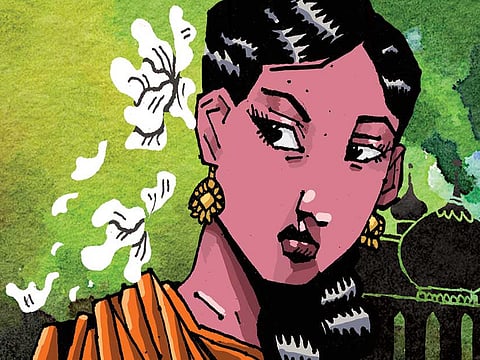Aspirational Indians
Set in Kolkata and Delhi, the stories in this debut collection by Shuma Raha are layered and fearlessly address social issues

The Love Song of Maya K and Other Stories
The Love Song of Maya K and Other Stories came by post wrapped in a huge plastic packet. The layer was quickly removed. There was the book wrapped tightly in brown paper. That layer was shed too. And then there was another paper wrapping. Impatience set in as this covering proved stubborn. One had to deploy the services of a Gorkha adept at dissecting with a sharp instrument. That did the trick. The Gorkha attacked the brown packet with great ferocity, peeling off one layer at a time with undivided attention.
There was suspense. There was dexterity. There was triumph. “So many layers — five in all,” the Gorkha declared with eyes narrowed and a few creases on the forehead, brandishing the book in one hand, the sharp instrument in the other; the sense of satisfaction tinged with vexation writ large on an otherwise expressionless countenance. It is always unnerving to see a Gorkha agitated. It, in fact, is disturbing.
The Love Song of Maya K by journalist Shuma Raha, a collection of 13 short stories, is quite like the careful wrapping it came in. It has several layers. There is suspense. There is dexterity. There is triumph. The book satisfies. The book vexes with the social issues it addresses.
This is Raha’s debut novel. It is set in Kolkata and Delhi and takes the reader on a journey of life. The opening story, Smell the Coffee Beans, Please is telling and involves a young woman from a middle class family with grand dreams; of a life filled with wonder. Does she succeed in her grand design? Does life in Kolkata offer her an escape from the monotonous claustrophobia of the daily grind? This story sets the tone for the rest of the book. It grabs you and forces you to read, line by line, savouring every note like a fine beverage.
India is transitioning through a strange time in history. Muslims are being singled out and hounded. There are those who look the other way, complicit in their silence. Raha has had the courage to address the issue: The Kill is disturbing. The story highlights the macabre brutality being perpetrated by one section of society. And those who are complicit in their silence fan this cancer of hate, smug that their perverse ideology is taking root.
Raha’s writing is lucid. The narrative is sharp and does not meander. It paints a picture and tells a story. There are no wasted words. She addresses social problems that have eaten into the fabric of India — the disdain for dark skin and obsession with superstition. Raha examines relationships, inter-faith marriage, same sex relations, prostitution and marital rape.
Love Song is a serious read. Raha’s style of writing adds humour to situations. It is clever and entertains. But even as one chuckles, there is always that underlying theme of social discontent. Raha is finely skilled at the art of short story-telling because she holds the reader in suspense as she weaves her story and polishes her craft. And at the end of a story, there is amazement — one did not see it coming.
There are a few favourites in this collection — The Leaving, Saturn’s Ring, Do They Have a Merc? and of course, the title story. This is a powerful book.
It has deep insight into Indian society. It is gripping. It is disturbing.
Love Song enthralls as it examines social mores, customs and beliefs. Raha cares for her art: writing. And telling a good story is never easy — like a love song. It must care.
Sign up for the Daily Briefing
Get the latest news and updates straight to your inbox

